Related Research Articles

Passamaquoddy Indian Township Reservation is one of two Indian reservations of the federally recognized Passamaquoddy tribe in Washington County, Maine, United States. The population was 760 at the 2020 census. Most of the 2,500 members of the tribe in the United States live in other parts of Maine. The reservation is located about 13 miles west-northwest of the city of Calais.
The Penobscot are an Indigenous people in North America from the Northeastern Woodlands region. They are organized as a federally recognized tribe in Maine and as a First Nations band government in the Atlantic provinces and Quebec.
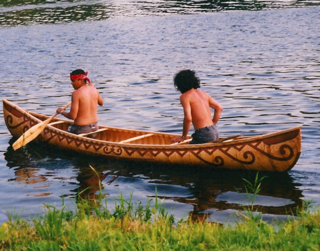
The Passamaquoddy are a Native American/First Nations people who live in northeastern North America. Their traditional homeland, Peskotomuhkatik, straddles the Canadian province of New Brunswick and the U.S. state of Maine in a region called Dawnland. They are one of the constituent nations of the Wabanaki Confederacy.

The Maine Legislature is the state legislature of the U.S. state of Maine. It is a bicameral body composed of the lower house Maine House of Representatives and the upper house Maine Senate. The Legislature convenes at the State House in Augusta, where it has met since 1832.
The Wəlastəkwewiyik, or Maliseet, are an Algonquian-speaking First Nation of the Wabanaki Confederacy. They are the indigenous people of the Wolastoq valley and its tributaries. Their territory extends across the current borders of New Brunswick and Quebec in Canada, and parts of Maine in the United States.

The Maine House of Representatives is the lower house of the Maine Legislature. The House consists of 151 voting members and three nonvoting members. The voting members represent an equal number of districts across the state and are elected via plurality voting. The nonvoting members represent three of Maine's Native American tribes, though two tribes have declined to send representatives. Each voting member of the House represents around 8,800 citizens of the state. Because it is a part-time position, members of the Maine House of Representatives usually have outside employment as well. Members are limited to four consecutive terms of two years each, but may run again after two years.
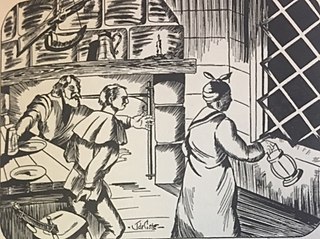
The Battle of Fort Cumberland was an attempt by a small number of militia commanded by Jonathan Eddy to bring the American Revolutionary War to Nova Scotia in late 1776. With minimal logistical support from Massachusetts and four to five hundred volunteer militia and Natives, Eddy attempted to besiege and storm Fort Cumberland in central Nova Scotia in November 1776.

The Wabanaki Confederacy is a North American First Nations and Native American confederation of four principal Eastern Algonquian nations: the Miꞌkmaq, Maliseet (Wolastoqey), Passamaquoddy (Peskotomahkati) and Penobscot. The Western Abenaki are also considered members, being a loose identity for a number of allied tribal peoples such as the Sokoki, Cowasuck, Missiquoi, and Arsigantegok, among others.

This is a list of the National Register of Historic Places listings in Washington County, Maine.

Joint Tribal Council of the Passamaquoddy Tribe v. Morton, 528 F.2d 370, was a landmark decision regarding aboriginal title in the United States. The United States Court of Appeals for the First Circuit held that the Nonintercourse Act applied to the Passamaquoddy and Penobscot, non-federally-recognized Indian tribes, and established a trust relationship between those tribes and the federal government that the state of Maine could not terminate.
Vera J. Francis is an Native American educator, environmental activist, and community planner for the Passamaquoddy people. She resides in Perry, Maine within the Passamaquoddy Pleasant Point Reservation (Sipayik). Francis writes and speaks frequently about environmental issues and tribal politics in newspapers, at conferences and on websites.
Concouguash, christian name Francis Joseph Neptune, (1735–1834) was chief of the Passamaquoddy tribe during the American Revolutionary War. He succeeded his father, Bahgulwet, who died in 1778, and was succeeded by his own son, John Francis Neptune, in 1824. The term "chief" later became the word for governor. Becoming chief is passed along through family lineage and requires acceptance from the Passamaquoddies, Penobscots and Maliseet tribes. These three tribes share similar chief induction ceremonies, conducted simultaneously with eyewitnesses from each tribe present.
Lewis Mitchell (1847–1930), a Native American member of the Maine State Legislature in the late 1800s into the early 1900s, is known for his advocacy of the Passamaquoddy people and his work on a plethora of writings in the Passamaquoddy language, of which only some have been preserved. Although he was Passamaquoddy, he was widely versed in Wabanaki tradition, as Wabanaki was the overall surrounding language and more general culture of not just Maine, but the Canadian and New England area, home to several indigenous tribes during this time period.
Birch Point, also known as Clark's Point, is a peninsula in Machiasport, Maine. It separates Sanborn Cove to the north from Larrabee Cove to the south on the west side of Machias Bay, a short way south of the mouth of the Machias River. The point is of prehistoric and historic importance to the local Passamaquoddy people, as it is the site of large panels of rock art which have been listed on the National Register of Historic Places.
The Maine Indian Newsletter was a monthly newsletter published independently from 1966 to 1972 in Gardiner, Maine and Freeport, Maine. While the exact address is not listed, the office was on Pine Street in Freeport. All of the articles archived by Dawnland Voices have Pine Street listed as the place to send submissions and money.
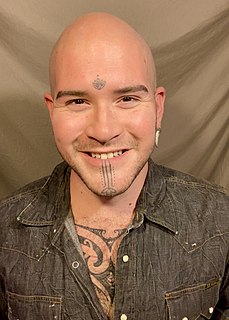
Geo Soctomah Neptune is a Passamaquoddy Two-Spirit, master basket maker, activist, storyteller, model, and educator from Indian Township, Maine. Neptune uses they/them pronouns.
Rena D. Newell is the Passamaquoddy tribal representative to the Maine House of Representatives. As of February 2020, she is serving her second two-year term and is the only tribal representative in the Maine House.
David Moses Bridges was a Native American environmentalist and artist known for his traditional birchbark canoes and baskets. He was a member of the Passamaquoddy tribal community on the Passamaquoddy Pleasant Point Reservation. Bridges fought for tribal environmental rights and was a co-founder of Mulankeyutmonen Nkihtakmikon, to preserve the Wabanaki culture.
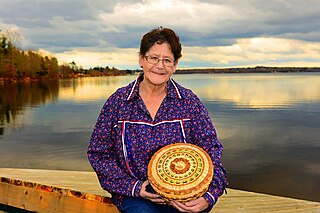
Molly Neptune Parker was an American basket weaver. She became well known for her artistry, with her works selling for thousands of dollars. As a co-founder and president of the Maine Indian Basketmakers Alliance, she tutored young people in the traditional craft and also educated four generations of her own family. She was also the first woman lieutenant governor of Indian Township, one of the two governing bodies of the Passamaquoddy tribe.
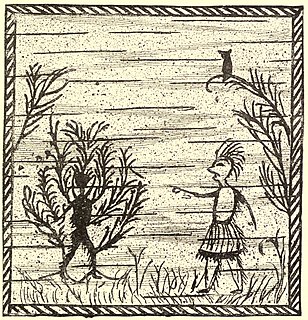
Tomah Joseph (1837–1914), a.k.a.Joseph Tomah and Tomah Josephs, was a Passamaquoddy artist and governor of communities in Maine in the United States. He taught the future US president Franklin Delano Roosevelt how to canoe.
References
- 1 2 3 "Donald G. Soctomah". 15 July 2011.
- ↑ "Committed to His Native Roots: Soctomah to Be Honored for Contributions". Indian Country Today Media Network.com. Indian Country Today Media Network. Retrieved 9 April 2015.
- ↑ "Archived copy". Archived from the original on 2016-04-25. Retrieved 2016-04-30.
{{cite web}}: CS1 maint: archived copy as title (link) - ↑ "Constance H. Carlson Prize".
- ↑ Cassidy, Katherine (March 10, 2006). "Soctomah to speak at UMM Graduation". Bangor Daily News. Retrieved 8 May 2015.
- 1 2 Spencer, Randy (March 8, 2005). "Profile: Donald Soctomah". Downeast Times. Retrieved 8 May 2015.
- ↑ Tree, Christian. "History Lies Down East; Where The Passamaquoddy Indians and The French Made Their Marks on Maine". thebostonglobe.com. The Boston Globe. Retrieved 22 April 2015.
- ↑ Rudin, Ronald (2009). Remembering and Forgetting in Acadie: A Historian's Journey Through Public Memory. University of Toronto Press.
- ↑ Sanger, David; Pawling, Micah; Soctomah, Donald (2006). "Passamaquoddy Homeland and Language: The Importance of Place". In Kerber, Jordan (ed.). Cross-cultural Collaboration: Native Peoples and Archaeology in the Northeastern United States. Lincoln: University of Nebraska Press. pp. 314–328.
- ↑ Holladay, Meg (December 2012). "Reviving Passamaquoddy: A Community Finds Healing in Its Own Words". Cultural Survival Quarterly. 36 (4). Retrieved 8 May 2015.
- ↑ Higgins, AJ. "Maine Drops Place Name Usage of Indian Slur". thebostonglobe.com. The Boston Globe. Retrieved 22 April 2015.
- ↑ Webber, Kate. "Maine Humanities Council Honors Passamaquoddy Tribal Historian Donald Soctomah". bangordailynews.com. The Bangor Daily News. Retrieved 22 April 2015.